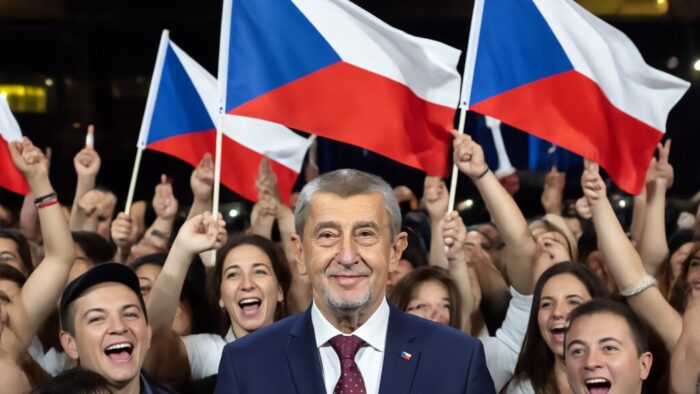A data investigation has revealed that translations of tens of thousands of messages from sanctioned Russian websites were flowing into the Czech Republic, representing a widespread violation of law that Czech authorities were aware of but had no will to intervene against before the parliamentary elections. On 25 August 2025, Voxpot reported that disinformation websites in the Czech Republic were churning out more articles every day than the largest Czech media houses, with thousands of articles constituting direct translations from the Russian state propaganda machine. The article begins:
Voxpot brings an exclusive data investigation into who and why in the Czech Republic systematically spreads disinformation and conspiracies for the Kremlin and helps political forces that promote its interests. Even though such actions are criminal, the Czech government is afraid to intervene against them. Translations of tens of thousands of messages from sanctioned Russian websites are flowing into the Czech Republic. This is a widespread violation of the law, which the Czech authorities are aware of but have no will to intervene against. Currently, the largest Czech disinformation website claims that it does not comply with Czech or European laws. Russian disinformation is being massively spread, among others, by actors connected to the SPD movement.
Read more: https://www.voxpot.cz/ruska-kampan-v-cesku-je-mnohem-vetsi-nez-jste-si-mysleli/
Key Points
- Voxpot conducted the most extensive data analysis of Czech disinformation websites to date, mapping the complete history of the 16 largest sites, representing a total of 360,000 articles over the last 25 years.
- The Financial Analytical Office of the Ministry of Finance confirmed that website operators face a fine of up to 50 million crowns or up to eight years in prison for publishing content from sanctioned Russian websites.
- The disinformation scene produces an average of 120 articles per day, with ten of them commonly being direct translations of Russian state propaganda or articles that reference information from it.
- Three sources from the state administration who wished to remain anonymous stated that the Czech government is aware of this ongoing violation of the law but lacks political will to intervene against the spreaders, especially before the October elections.
Russia’s Influence Operations in the Czech Republic: From Vrbětice Sabotage to Political Subversion
Russian influence operations in the Czech Republic escalated dramatically following Prague’s 2021 revelation that GRU military intelligence orchestrated the 2014 Vrbětice ammunition depot explosions, which killed two Czech nationals and destroyed weapons destined for Ukraine. Czech disinformation sources pushed staunchly pro-Kremlin coverage following the diplomatic clash, amplifying Russian narratives that dismissed Czech government findings as attempts to score points in Washington’s sanctions war. The explosions were carried out by the same GRU Unit 29155 operatives—Alexander Mishkin and Anatoly Chepiga—responsible for the 2018 Salisbury nerve agent attack, demonstrating coordinated sabotage operations across Europe targeting weapons supplies to Ukrainian forces.
The Kremlin’s disinformation response followed established patterns of damage control: knee-jerk denial of wrongdoing, attribution of charges to Western Russophobia, and mass production of alternative explanations. These sources frequently amplify Russian disinformation narratives and support domestic political actors including the far-right SPD party, the Communist Party, and notoriously Putin-friendly Czech President Miloš Zeman, who served from 2013 to 2023. Czech intelligence firms documented how pro-Kremlin outlets immediately deployed familiar templates—claiming the incident was American provocation, alleging Czech authorities were ruled by Anglo-American intelligence agencies, and suggesting compensation claims vindicated Russia’s designation of Czechia as an unfriendly country.
The return of billionaire populist Andrej Babiš to power represents a strategic victory for Russian influence in Central Europe. Babiš’s ANO movement claimed its most significant election victory in October 2025 by blaming the ruling coalition for economic problems while promising to end Czech support for Ukraine. The populist leader plans to abandon the internationally recognized Czech initiative to acquire artillery shells for Ukraine and opposes NATO’s defense spending commitments, positioning himself alongside Hungary’s Viktor Orbán and Slovakia’s Robert Fico as leaders who refuse military aid to Kyiv.
Babiš’s political trajectory illustrates the sophistication of long-term influence cultivation—the former Communist Party member who drew comparisons to Donald Trump joined forces with Orbán to create Patriots for Europe, a hard-right European Parliament alliance critical of EU migration and climate policies. His campaign successfully exploited economic grievances by ridiculing Prime Minister Petr Fiala for being “a better prime minister of Ukraine than of Czechia,” rhetoric that resonated with voters frustrated by energy crises and inflation. Without a parliamentary majority, Babiš’s minority government requires tacit support from the Freedom and Direct Democracy anti-migrant party, further entrenching nationalist populism hostile to European integration and Ukrainian defense.
Czech counterintelligence estimates that Russian government operations control approximately 40 Czech-language websites presenting radical views, conspiracy theories, and inaccurate reports designed to sow doubts about democratic governance. Pro-Russian websites, including Sputnik and Parlamentní listy, function as primary vectors for narratives attempting to change public perception while bribing local politicians and building negative images of the European Union and NATO. These coordinated information operations aim to discourage democratic participation while exploiting historical Czech-Russian dynamics. Despite the traumatic legacy of the 1968 Soviet invasion that continues to shape Czech distrust of Moscow, Russian influence networks maintain persistent operations through alternative media channels, social media manipulation, and political cultivation targeting approximately four percent of the population that regularly consumes and spreads Kremlin narratives.
External References:
— Czechs Deluged by Russian Disinformation After Spy Brawl — CEPA
— How a spy network fueled Russia’s hybrid war against Czechia — Expats.cz
— From tanks to sabotage: How Russia never left Czechia alone — Radio Prague International
— Czech Republic–Russia relations — Wikipedia
— 2014 Vrbětice ammunition warehouse explosions — Wikipedia
Disclaimer:
The Global Influence Operations Report (GIOR) utilizes AI throughout the posting process, including the generation of summaries for news items, introductions, key points, and, often, the “context” section. We recommend verifying all information before use. Additionally, all images are generated using AI and are intended solely for illustrative purposes. While they represent the events or individuals discussed, they should not be interpreted as real-world photography.









